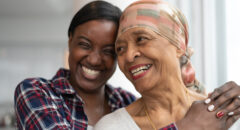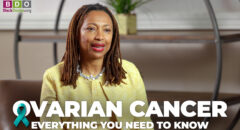
While we often think of conditions like high blood pressure and diabetes as “silent killers,” there’s another one lurking that few people consider. Its name is ovarian cancer.
Known for its subtle symptoms and sometimes confusing diagnoses, ovarian cancer is especially challenging for Black women. And it’s deceiving. Although ovarian cancer is less common among Black women than other races, it’s also way more serious when it does occur.
Turns out, Black women are more frequently diagnosed at later stages, facing higher rates of mortality, worse outcomes, and symptoms that are more difficult to treat.
Let’s break it down based on the latest genetic, oncological, and epidemiological studies available…
Prevalence and Mortality
When it comes to cancers among women, there are more prevalent types. Breast cancer, to name one. But did you know that due to its diagnosis delays and deadliness, ovarian cancer is one of the most concerning?
According to the American Cancer Society, roughly 19,700 U.S. women will be diagnosed in 2024, and over 13,000 will die as a result. Of those Black women diagnosed, a significantly higher percentage may die.
In one study from Cancer Epidemiology, Biomarkers & Prevention, Black women were found to frequently receive advanced-stage diagnoses, dramatically lowering their survival rates. Although the exact reasons for this are unknown, experts speculate that healthcare barriers, socioeconomic constraints, and different symptoms may all be to blame.
RELATED: Silent Killer: What Black Women Must Know About Ovarian Cancer
Genetic Factors
Genetics are everything.
Well, not everything, but they sure do play a big role! When it comes to ovarian cancer in Black women, the two most prominent genes are BRCA1 and BRCA2. In fact, mutations in these genes are responsible for increases in ovarian and breast cancer.
These mutations also complicate early detection and treatment. Although these gene mutations affect all races, they appear to be most harmful to Black women. This has been shown to lead to more aggressive cancers, as well as unique difficulties in genetic testing.
The reasons for this are complex. First off, ovarian cancer is usually symptom-free in its early stages. And when symptoms do start to show, many women may write them off as something else. After all, problems like bloating, urination changes, and stomach pain can be caused by a variety of things.
Then there’s the lack of adequate screening. Many cancers, like cervical cancer, are detected through early tests such as Pap smears. Ovarian cancer, however, does not have nearly the reliable testing tools. It’s also difficult to consistently pick it up on imaging or tests of biomarkers.
In other words, it likes to stay hidden!
Prevention and Management
Like with any disease or illness, being proactive can go a long way. Although we’ve already mentioned how the testing is lacking, that doesn’t mean Black women should skip it altogether. Whether you have symptoms or not, consider genetic testing. If you have a family history of ovarian or breast cancer, you definitely need to get tested.
Also, don’t neglect your gynecologist. Get checked out regularly, especially with pelvic exams and transvaginal ultrasounds.
Another important step is getting educated. Speak to people who are unaware and encourage them to join you in learning more. Seek community-based programs, or look online for webinars, workshops, and networking opportunities. At the very least, seek medical information from authority websites and organizations.
And finally, if you have the time to commit, be a voice for change. One of the reasons for a lack of positive outcomes among Black women is the lack of comprehensive health care. Although most insurances will cover diagnostics, drugs, surgery, and chemo, they don’t always cover treatments for advanced diagnoses – which affect Black women most.
So do your best to find a plan that meets your needs. Speak with your doctor, as many healthcare professionals deal with the headaches of insurance daily. They may know better than most!
RELATED: Five Things You Must Know About Ovarian Cancer Screenings
Looking Ahead
While the idea of a “silent killer” can be scary, there’s no need to panic. Just think of ovarian cancer as any other disease or disorder down the road. The first thing you want to do is live your life healthy. Take general steps to improve your well-being, and don’t fear the unknown (or known).
Knowledge is power. After all, it’s better to be prepared and not need it, than need it and not have it.
If you want to get more involved, look into orgs like the Ovarian Cancer Research Alliance (OCRA) and the National Cancer Institute (NCI). They are doing their best to address all of the issues surrounding this cancer, especially for marginalized communities.
At the end of the day, it’s all about collaboration. By increasing awareness, pushing for fairness and access, and talking openly about challenges, we’re all a step closer.
And that’s a beautiful thing…







